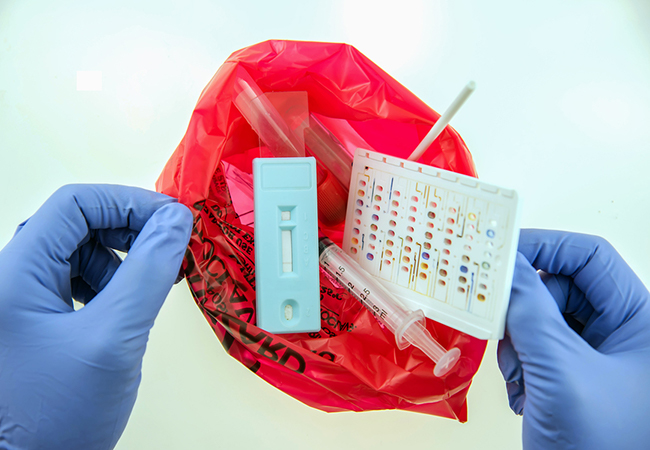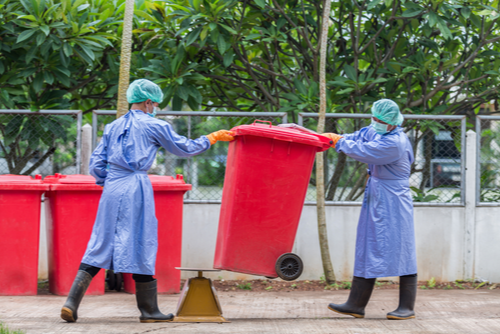Area Treatment: Smooth and Reliable Medical Waste Removal Near Me
Area Treatment: Smooth and Reliable Medical Waste Removal Near Me
Blog Article
Remain Compliant and Safe: Just How to Take Care Of Medical Waste Properly
In today's ever-changing medical care landscape, guaranteeing compliance and security when it comes to clinical waste disposal is of utmost relevance. In this conversation, we will certainly explore the numerous kinds of clinical waste, the affiliated risks, the legal requirements, and the best practices for preserving a compliant and safe medical waste management system.
Importance of Proper Medical Garbage Disposal
Appropriate medical waste disposal is of utmost significance in making sure the security and wellness of both health care workers and the general public. Clinical waste, which consists of products such as utilized needles, polluted dressings, and expired medications, poses major health and wellness risks if not handled and thrown away properly.

Additionally, inappropriate disposal of medical waste can bring about environmental contamination. When medical waste is not set apart, dealt with, or disposed of properly, it can discover its way right into garbage dumps or bodies of water, potentially contaminating the soil, air, or water sources. This can have detrimental effects on ecosystems and human health and wellness, as harmful materials may seep right into the setting or be launched into the environment.
Sorts Of Medical Waste and Their Threats
The varied range of medical waste generated by health care centers provides numerous threats that should be thoroughly dealt with to guarantee correct disposal and prevent potential damage to public health and wellness and the setting. Medical waste can be classified right into different categories based on its qualities and degree of risk.
One type of medical waste is infectious waste, that includes items that are infected with blood or other potentially infectious materials. This can include made use of needles, syringes, and various other sharp items, in addition to tissues, swabs, and dressings from patients with infectious illness. Incorrect disposal of infectious waste can result in the transmission of dangerous pathogens and the spread of infections.
An additional group is hazardous waste, that includes materials that are harmful, flammable, destructive, or responsive. This can consist of chemicals, pharmaceuticals, and specific clinical devices. Mishandling or incorrect disposal of hazardous waste can result in environmental contamination and pose threats to the health of waste employees and the public.
Contaminated waste is one more kind of clinical waste that must be thoroughly managed. This waste includes materials which contain contaminated substances, such as utilized radiation treatment resources or polluted lab materials. Improper handling or disposal of radioactive waste can result in radiation direct exposure and serious wellness risks.
Last but not least, non-hazardous general waste, such as paper, packaging products, and food waste, is likewise generated by health care centers. While this waste might not position considerable threats, it still needs to be properly managed to maintain sanitation and avoid the tourist attraction of bugs.
To make sure the risk-free disposal of medical waste, healthcare facilities must implement proper segregation, storage space, treatment, and transportation techniques. This includes using appropriate containers, labeling, and training for staff, along with abiding with regional policies and guidelines. By resolving the dangers connected with various kinds of clinical waste, health care facilities can protect public wellness and the atmosphere.
Regulative and lawful Needs for Disposal
In order to make sure the safe and correct disposal of clinical waste, health care centers need to comply with lawful and regulative useful source requirements. These demands are in area to safeguard public wellness and the atmosphere from the possible hazards associated with medical waste. Clinical waste is categorized as an unique category of waste as a result of its potential to send infectious illness and contain hazardous materials.

Some usual needs include the segregation and appropriate product packaging of medical waste, the use of authorized containers and labels, and the application of risk-free handling and transport procedures - medical waste removal near me. Healthcare facilities may likewise be needed to preserve documents of their waste monitoring methods and give documentation to regulatory authorities upon request
Failure to follow these governing and lawful needs can cause penalties, fines, and reputational damage for healthcare facilities. It is, for that reason, essential for doctor to focus on conformity and develop durable waste monitoring methods to make certain the secure and correct disposal of clinical waste.
Ideal Practices for Safe Medical Waste Monitoring
Medical care centers need to comply with market finest practices to ensure the safe and effective monitoring of clinical waste - medical waste disposal services with WasteX. Executing these best methods not only assists protect the atmosphere and public health but likewise reduces the danger of potential legal and economic repercussions
Among the essential ideal practices is the appropriate partition and containment of different sorts of clinical waste. This involves utilizing color-coded containers and plainly identifying them to make sure that each kind of waste is gotten rid of appropriately. Additionally, health care centers should have assigned locations for storage space and disposal of medical waste, with clear guidelines and treatments in area.
One more important element of risk-free clinical waste monitoring is the training and education of health care personnel. All employees that handle medical waste needs to obtain extensive training on the correct handling, storage, and disposal treatments. It is important to make certain that staff members are conscious of the prospective dangers related to clinical waste and are outfitted with the necessary knowledge and skills to handle it safely.
Routine tracking and auditing of waste administration methods is likewise important. This includes on a regular basis assessing waste monitoring treatments, performing inspections, and preserving exact documents. By checking waste monitoring techniques, medical care centers can determine any type of prospective issues or areas see it here for renovation and take rehabilitative activities accordingly.
Lastly, medical care centers must prioritize the use of eco-friendly disposal techniques whenever possible. This includes making use of waste treatment technologies such as autoclaving or incineration, which can aid minimize the volume and dangerous nature of clinical waste.
Eco-Friendly Solutions for Medical Garbage Disposal
Executing environment-friendly services for clinical garbage disposal is critical for health care facilities to decrease environmental impact and make sure sustainable techniques. Standard methods of clinical waste disposal, such as incineration and landfilling, have been found to release harmful contaminants right into the air and contaminate dirt and water sources. Therefore, there is an expanding need for different techniques that are both ecologically pleasant and risk-free.
These systems use innovative modern technologies to safely process medical waste within the health care center itself. By dealing with the waste on-site, transportation emissions and threats linked with off-site disposal are lowered.
One more environment-friendly strategy is the fostering of recycling programs for sure sorts of medical waste. Products such as glass, plastics, and steels can be recycled instead of disposed of in landfills. By implementing segregation and recycling programs, health care facilities can substantially lower their waste volume and minimize their ecological impact.
In addition, healthcare facilities can explore the use of recyclable medical devices and materials. By selecting recyclable products, as opposed to single-use alternatives, the amount of waste generated is significantly reduced. Recyclable products can be disinfected and utilized several times, leading to cost savings and much less ecological effect.
Final Thought
In final thought, appropriate disposal of clinical waste is vital for preserving compliance and ensuring safety and security. Recognizing the kinds of medical waste and their associated threats is very important in order to execute the proper disposal techniques. Abiding by lawful and regulative demands is vital for avoiding fines and securing the environment. Adhering to best techniques for risk-free medical waste monitoring and checking out environmentally friendly solutions can add to a sustainable and liable method to garbage disposal in the medical care market.
In this discussion, we will certainly explore the different kinds of clinical waste, the involved threats, the lawful requirements, and have a peek at this site the finest techniques for preserving a secure and compliant clinical waste management system - medical waste removal services.One kind of clinical waste is infectious waste, which includes products that are polluted with blood or other potentially contagious products.Contaminated waste is an additional type of medical waste that should be very carefully taken care of. Clinical waste is classified as a special group of waste due to its potential to transmit infectious illness and consist of unsafe materials
Following best methods for secure clinical waste monitoring and discovering green remedies can add to a responsible and lasting strategy to throw away disposal in the medical care sector. medical waste disposal services with WasteX.
Report this page